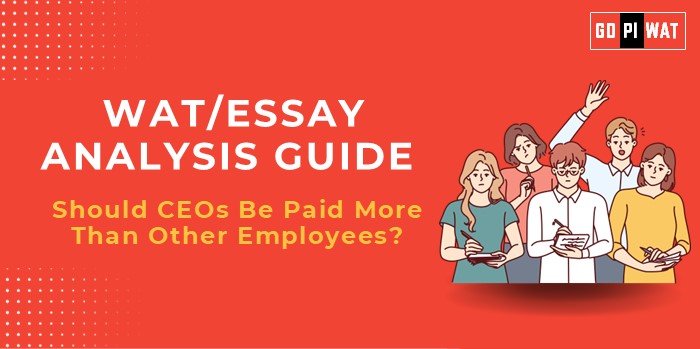📋 WAT/Essay Analysis Guide: Should CEOs Be Paid More Than Other Employees?
🌟 Understanding the Topic’s Importance
CEO compensation reflects broader themes like corporate governance, equity, and performance management, making it highly relevant for B-schools focused on leadership, ethics, and finance.
📝 Effective Planning and Writing
- ⏳ Time Allocation:
- 📋 Planning: 5 minutes
- ✍️ Writing: 20 minutes
- 🔎 Reviewing: 5 minutes
- 🖊️ Word Count Distribution:
- 📖 Introduction: 50–70 words
- 📝 Body: ~350 words
- ✅ Conclusion: 50–70 words
💡 Introduction Techniques for Essays
- ⚖️ Contrast Approach: “While CEOs command higher compensation for their strategic impact, questions arise over proportionality and its impact on employee morale.”
- 🌱 Solution-Based: “Striking a balance between equitable pay and rewarding leadership excellence is essential for sustainable corporate cultures.”
📚 Structuring the Essay Body
📈 Achievements:
- 🌟 Highlight successful CEOs driving innovation and shareholder value (e.g., Satya Nadella’s transformation of Microsoft).
- 📊 Use data (e.g., companies with top-performing CEOs outperform peers by 25%).
⚠️ Challenges:
- 💸 Rising ratios exacerbate inequality (e.g., US 400:1 vs. Japan <50:1).
- 📌 Case Study: France’s regulatory cap on executive pay to promote equity.
🔮 Future Outlook:
- 🚀 Suggest pay structures that integrate CSR and profit-sharing to balance leadership rewards and equity.
📄 Concluding Effectively
- ⚖️ Balanced Conclusion: “While CEOs’ contributions justify higher pay, addressing pay disparities is crucial to fostering a fair and motivated workforce.”
- 🌍 Global Comparison: “Countries like Sweden show how performance-based caps can balance equity and efficiency.”
✍️ Sample Short Essays
- ⚖️ Balanced Perspective: “CEO compensation reflects the unique responsibilities they shoulder. However, excessive disparities can hinder team collaboration and trust, calling for more inclusive reward systems.”
- 💡 Solution-Oriented: “By linking executive pay to CSR goals and team performance, organizations can reward leadership while promoting equity.”
- 🌍 Global Context: “Learning from Japan’s equitable pay structures can guide reforms that prioritize both leadership excellence and organizational morale.”


